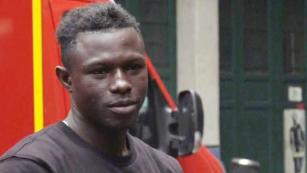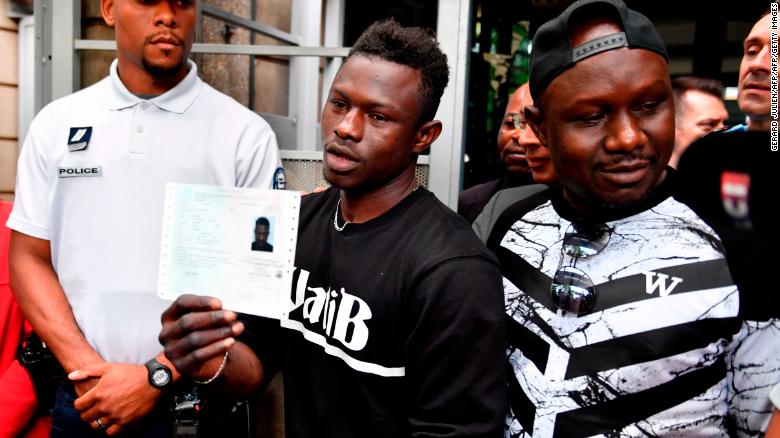Updated 1757 GMT (0157 HKT) May 30, 2018
Dawn Dimowo is a lawyer and senior consultant at africapractice, a Pan-African strategy and communications consultancy.
She studied in France for several years where she obtained graduate degrees from the Universite Pantheon Assas (Paris II) and worked at the International Criminal Police Organisation INTERPOL.
The opinions expressed in this commentary are solely hers.
Abuja, Nigeria (CNN)As a sans-papiers -- an immigrant without papers -- Mamadou Gassama should have been condemned to a life in the shadows, dodging immigration officials and living in bad social housing -- but for his superhuman feat of climbing four balconies to save a little boy from certain death.
No papers, but a desire for a better life. No papers, but strong arms and a brave heart.
By that singular act of bravery, Gassama suddenly qualified for French citizenship and showed that being a good immigrant is not so much about being legal or illegal, right or wrong, black or white. It is about being desired.
For immigrants of color the world over, desirability is too often judged by high achievement, by doing or going above and beyond the ordinary.
You cannot just be smart enough, talented enough, strong enough, brave enough. You must be exceptional.

Gassama's fast track route to citizenship will certainly remain the exception as French President Emmanuel Macron has made it clear that France cannot absorb all the misery in the world.
Life in France as an immigrant of color (legal or illegal) is no bed of roses. The misery is all too present in how they are viewed as second class citizens, denied access to jobs and routinely treated with suspicion by police and neighbors alike.
I was a graduate student at one of the best universities, the 'law school of the Sorbonne' and each time I mentioned where I studied, I could see how I was immediately rated an above par immigrant.
It also helped my standing in my part time job as a private English tutor for French students, helping with homework or preparations for rigorous exams.
And when I told the upper middle class parents of a 10-year-old boy I had been tutoring, that it was my last lesson, that I had completed my degree and would be leaving to work at a prestigious international organization, I visibly went up several notches in their estimation.
I was immediately asked to stay for an aperitif and engaged in a lengthy conversation about wine and French and English literature, and about my new job and plans.
I was suddenly, even more interesting than before. I became one of the good immigrants.
Until I wasn't. Two weeks later I would struggle with getting an apartment in a new city because as a black immigrant, I was immediately branded an unsuitable tenant until I could prove otherwise.
Experiences of this kind were, thankfully, few and far between for me, but for too many, they are everyday occurrences -- the stark reality of the immigrant experience when the social and political reflex is to presume the worst about you until you prove otherwise.
In France, many immigrants and their second generation children live in often deplorable conditions in social housing projects, in poor suburbs.
For them, the reality of life in France is unemployment, poverty and a life of racial profiling and discrimination by the authorities.
There have been violent protests and clashes with police over the years, including the notorious 2005 riots when Paris burned over a three-week period of clashes. Earlier this year, the lower house of the French National Assembly passed a stricter immigration law which introduced a one year prison sentence for illegal entry into the country.
The prime immigration hubs across the world have long favored the best and brightest, combined with an assessment in France that tests the immigrant's desire to integrate. According to stats released by the OECD and the French national statistics body INSEE in 2014, immigrants constitute under a tenth of the population (8.8%), and in terms of new arrivals, Africans are a smaller migrant group (30%) than Europeans.
But figures of asylum applications -- 100,000 in France in 2017 -- tend to get more traction and too often result in blanket policies and definitions -- 'no economic migrants' -- which ignore the different kinds of value immigration and migrants bring to the table.
Migrants are not only seeking a better life, better economic conditions for themselves and their families, many of them are also offering their skills and a willingness to contribute to the economy by working hard and also to impact the communities they live in, just as Gassama has done.
France's proposed immigration law, which will be debated by the French Senate in June, also shortens asylum application deadlines, while extending the time failed asylum seekers can be held pending deportation, demonstrating that even for political migrants, the country has no intention of making it easy.
The unanswered question for thousands of immigrants reading Gassama's story with pride -- how does their situation change?
When intrinsic worth and value as a human being is not always nearly enough for equal treatment in the eyes of the state and the law, how many extraordinary feats and acts of superhuman courage will it take to change attitudes on immigration and towards migrants?


No comments:
Post a Comment